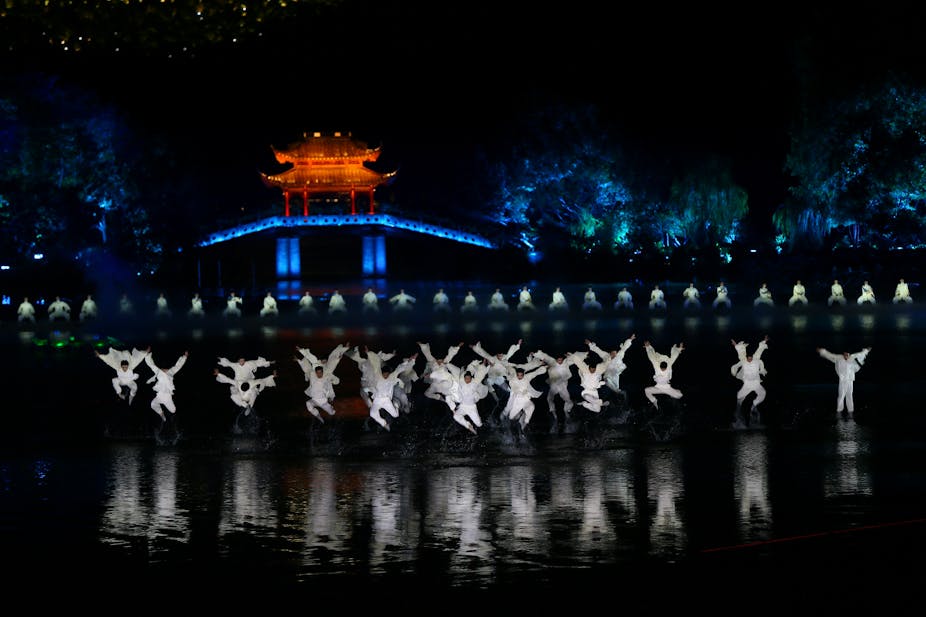It’s a wrap. China’s G20 leadership has come to a close in Hangzhou after G20 leaders were treated to a spectacular show on the West Lake. The final G20 communiqué confirms the necessary consensus for G20’s long-term vision and commits leaders to a blueprint for innovative growth, but falls decidedly short on substance.
The show
As Chinese President Xi Jinping closed the summit, state-run media outlet Peoples Daily Online announced to the twittersphere:
The 11th #G20 summit has just concluded with great success.
But was there really ever any other option? This is China after all.
In fact, from China’s perspective, the summit was a success well before the formalities of the event even began.
From the outset, China’s hosting of the G20 signalled a new phase in the nation’s global economic confidence and leadership. It offered the platform for promoting the Beijing economic model, including the “One Belt, One Road” initiative and Asian Infrastructure and Investment Bank (AIIB) on the world stage.
Making the most of its status as a developing nation, China brought the dual themes of development and inclusiveness more firmly into focus. By extending official consultations well beyond the circle of G20 members, and inviting a record number of guests from the developing world, China secured its claim to being the most inclusive G20 host.
The claim underscored China’s proposal for a G20 action plan for implementing the 2030 Agenda for Sustainable Development. US-Chinese joint ratification of the Paris agreement on climate change just hours ahead of the summit delivered a striking headline and offered the promise of a new model for G20 shared leadership.
In China’s eyes, each of these is a marker of success. For domestic audiences, China’s success was accentuated by intense state media coverage of key summit events. Xi’s keynote speeches provided a focal point, while the high-tech lakeside gala performance of Swan Lake proved a highlight. Unsurprisingly, contesting themes found limited airtime or print space.
The Hangzhou Consensus
Against this background, the leaders’ summit itself proved to be little more than a side event.
In part this reflected a distinct absence of information and communication. Inside the media centre, blank video screens gave little away. Press briefings were limited. Patchy internet and social media connections limited the potential for commentary and analysis, especially by foreign journalists.
The silence on matters of G20 substance, including the details of the final communiqué – made available only after Xi’s final press briefing – was deafening. When it did arrive, the nine-page, 7,000-word communiqué offered few insights. It was arranged around five themes:
policy co-ordination;
innovative economic growth;
financial and economic governance;
trade and investment; and
development.
The communiqué reflected the increasingly complex and technical language of G20 officials. Combined with its lack of concrete and measurable actions, the communiqué provides a clear signal that G20 leaders gained little collective ground during the summit.
Recognising that economic growth has been too slow for too long and for too few, the communiqué does set out an agreed longer-term vision for the G20. This so-called “Hangzhou Consensus” calls on the G20 to deliver more inclusive economic growth through co-ordinated macroeconomic policy, open trade and innovation. In short, it reaffirms the group’s core mandate: to make globalisation work for the benefit of all.
The consensus is followed by a raft of vague commitments for action. Ranging from innovation and the “new industrial revolution”, to issues of business financing, international tax avoidance, anti-corruption measures, open trade and implementation of the sustainable development goals, the commitments fall short of expectations.
Little real progress was made on key issues of climate change and energy. Other challenges that consumed the attention and energy of leaders on the sidelines, including co-ordinated responses to the Syrian crisis, refugees, terrorism and migration, remain unresolved.
Australia’s interests
For Australia an underwhelming G20 outcome is not a bad outcome.
Australia’s low-key objectives to strengthen moves against international tax avoidance, to boost confidence in global trade and open markets, and to highlight innovation as a driver of economic growth were largely met.
Sideline meetings with India’s prime minister, Narendra Modi, and the United Kingdom’s prime minister, Theresa May, point to positive bilateral prospects. On balance, the summit was probably worthwhile.
It is hard not to feel underwhelmed by the 2016 G20 and the Hangzhou Consensus it has delivered. But diplomacy is at its core an incremental business. In today’s complex and complicated world the opportunity for leaders to sit together at the G20 table is not to be underestimated.
Ultimately, though, G20 success is a matter of perspective. For many, the Hangzhou G20 has fallen decidedly short on substance. For others, it continued the incremental business of global economic governance. For China, there is only one outcome: the G20 was a great success.

